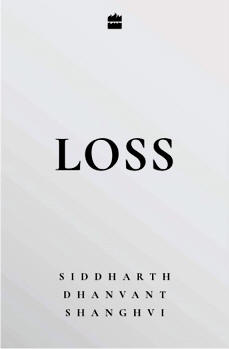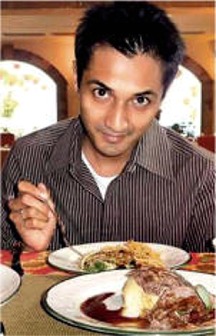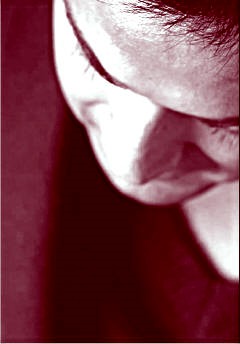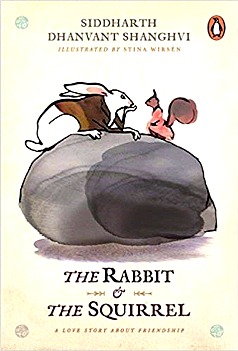|
siddharth dhanvant shanghvi
Shanghvi Siddharth Dhanvant
juhu
- mumbai 25 agosto 1977 |
PAGINA
1
-
2
loss
What does it mean to lose someone ? To answer
this timeless question, bestselling author Siddharth Dhanvant
Shanghvi draws on a string of devastating personal losses of his
mother, of his father and of a beloved pet to craft a moving memoir
of death and grief .
With surgical detachment
and subtle feeling, Shanghvi charts the landscape of bereavement as
he takes the reader down the dark, winding path to healing . Clear-eyed and intimate, Loss is the first Volume of non-fiction by
one of India's most beloved writer of life experience .
a mazon.in - fb/sds 2020 mazon.in - fb/sds 2020
https://openthemagazine.com/love-remains
-
ndtv.com/video-shanghvi
do you believe people
truly recover from the loss of a loved one?
Some recover, but mostly a skin
comes over the cut . Slowly you come to think of the deceased as
present but without form, still flawed, memorable and
irreplaceable - and with time, your recollection is not escorted by
suffering .
sheree gomes gupta - vogue.in - fb/sds 2020
Loneliness is a cave of bats that come out at
you each evening, a great black musty whoosh that suggests abject
isolation can be a form of purgatory.
loss - fb/sds 2020
... In a worst-case
scenario, I might be dead today; in the best, I’d be dead later .
Even with a blanket of white flowers at my feet, I had been thinking
about death . I don’t mean this in either a wallowing or
morbid way - as the end - but as an invitation to prepare myself :
to become death’s disciple . What can I do to die better
? Live urgently, of course, and mindfully, but also in a
way that lays vigil to the conclusion . The miracle of
being alive is lost in the exhaustion of staying alive .
Now I know that I want to enter my death as if it were a garden of
beautiful trees, or a bench I had sat on before the sea, or a train
I had boarded to a destination of no known address except that it
was home, some place where I might be finally myself .
I am writing this on Diwali, I am alone and unspeakably happy, with
one family secret to share with you: everything is just right
.
... eight months alone in a village in the pandemic -
thehindu.com - fb/sds 2020
.
grief
is not a record of what have been lost but who have been loved
fb/sds - 27.8.2020
.
|

roma
2008
facebook.com |

I love novellas !
They’re seductive and profound
with a genius of concision
that clarifies meaning and makes
beauty more irresistible
and truth invincible
dnaindia.com |
FACEBOOK
|
On this
trip to Rome
at the home of Jonathan Doria
Pamphilj, I was walled in by works
of Raphael, Caravaggio, Titian,
Velazquez - over 650 art world
legends in his “house” of a 1000
rooms. At one point, after a family
dinner, the golden hue of the lamps
sprayed over a painting in the
salon. Something, wordlessly,
shifted. “A real work of art
destroys, in the consciousness of
the receiver, the separation between
himself and the artist,” wrote
Tolstoy.
Thank you for
your wisdom and grace, JDP. If any
friends are passing through Rome
swing by Palazzo Doria Pamphilj for
an education in art, beauty and
stillness.
“But what about
Venice?”
Oh Junior, no,
no, no
fb/ss -
9.5.2019 |
|

Sometimes
I wonder why people friends - lovers
- allies – leave our
lives
The answer is: They do because they do. But the more who leave the
chambered heart, the more it is returned to its authentic silence,
its original darkness. Every diya you light tonight is a remembrance
that the person you have been waiting for to return is so deep in
memory it not possible for them to leave
: you are the sum total
of all you have known together .
In the darkness of their
departure, when you are entirely alone, the sort of alone comparable
to old oaks and sentinels, know that everyday you wake up you are
already in the best company
Yourself .
Everything is just right.
Happy Diwali 2012
- facebook.com/shanghvi -
http://it.wikipedia.org/wiki/Diwali
|
you have said
'I needed to write the books then to
make the photographs now.'
why?
Perhaps
because the photographs have
angularity, economy.
The
photographs worked for the force and
stillness the books did not have.
In a
sense the books were a kind of
apprenticeship.
All things are about voice,
about finding it and the books might
have been a kind of throat-clearing
for other songs.
sandip roy - firstpost.com -
2013 |
. I’D HAVE
LIKED TO ASK MR. GANDHI WHAT THAT
MEANS '
I AM YOUNG '
I MYSELF
NO LONGER HAVE A CLEAR IDEA. PERHAPS
IT MEANS BEING SO DISILLUSIONED WITH
LIFE IN MODERN INDIA THAT, QUITE
FRANKLY, NEVER MIND THE CONGRESS’S
ELECTION PROMISE OF ERADICATING
POVERTY, I’D LIKE HIM TO BUY ME A
SCOTCH AND SODA NOW. IT MAY MEAN
BEING SO ANGRY AT THE LARGER FAILURE
OF THE SYSTEM, THE PHYSICAL FAILURE
— THE POTHOLED ROADS, THE POWER
SHUTDOWNS — THAT ONE’S ANGER CAN
BECOME UTTERLY MUTE FROM ITS WEIGHT.
AND IT MAY ALSO MEAN BEING SO BORED
BY THE FAILURE OF CULTURAL
ORIGINALITY — THE ABSENCE OF
ANYTHING BEYOND BOLLYWOOD, AND THE
FACT THAT MOST OF OUR CONTEMPORARY
ART IS SHAMELESSLY DERIVATIVE OF
WESTERN WORK — THAT THE INERTIA OF
IMAGINATION CAN KNOCK YOU OUT COLD.
IF MR. GANDHI BELIEVES YOUTH IS
GIVEN TO IMPETUOSITY, I’D SAY TO HIM
THAT IT IS ALSO MARKED BY
RESTLESSNESS: YOUNG PEOPLE DRIFT.
SOMETIMES THE FORCES IN A COUNTRY,
BE IT CORRUPTION IN THE POLITICAL
CLASSES OR BAD GRAMMAR IN THE
NATIONAL PRESS, PROVOKE A
REVOLUTION. AND SOMETIMES, WHEN IT
APPEARS THE REVOLUTION WILL EXHAUST
ITSELF BEFORE EVER BEGINNING, THE
COMPUTER SERVERS IN INDIA FOR
GETMEOUTOFHERE.COM WILL CRASH.
fb/sds -
nytimes.com - 2013 |
|
|
THE RABBIT AND THE SQUIRREL
CHILDREN BOOK
to be truly adult is to be
child-like
sds |
.
Has everything
changed ?
the
Squirrel asked the Rabbit
‘Yes’, he said after a moment.
‘Yes,
it has: It has become more itself.’
‘Alright
then,’ she said, relieved. ‘I was
afraid I’d lost ...
’ She wanted to say you, but
what she really meant was that
without him she’d lost the version
of herself she had known most
acutely. ‘I
was afraid I’d lost everything,’ she
said, almost to herself.
They looked up
at the Christmas moon.
She felt tiny,
as if with every breath that she
drew she vanished some more. But
here, with the Rabbit by her side,
she felt she was vanishing with
someone. That’s it, she told herself,
to vanish with a friend, to see the
invisible with equal eyes, to know
together the dark side of the moon.
‘I have so much to tell you,’ she
said, ‘that only silence will
suffice.’
‘Yes.’
‘Thank
you,’ she said, for tonight she
could lay down the erratic forces of
her mood, her compulsions and
desires - the awful doubt that she
actually existed and that perhaps
this was not the best of ideas. She
gripped his hand, and the wild,
spinning compass of her heart came
to still.
A cloud went across the moon, but on
passage revealed a sky of unwavering
brightness.
xmas
tale by sds in goa -
fb/sds 2013
.
So it’s
raining like bonkers and I’m a
little sloshed and a little blue as
some friends and I are headed to
this totally divey pizza joint in
Anjuna and I wanted to tell you I
wrote a new book, a little fable,
actually it was something I made a
few years ago for someone, with
love, for love, so here it is, The
Rabbit & The Squirrel, illustrated
by my beloved friend Stina Wirsen
.
fb/sds -
11.6.2018
.
I wrote
The Rabbit and the Squirrel five
years ago, as a gift of love for
someone. I never thought
it would see the light of day – it’s
publication is a sweet, divine
accident
-sds
timesofindia.indiatimes.com
-
facebook.com/tnlindia/videos
- 2018
.
A Love Story
about Friendship - A stunning
picture book about love, friendship
and sexuality, with a dash of
absurdity.
Lit with
longing, and tender questions of the
heart, The Rabbit and the Squirrel
is a fairy tale for the modern day
by one of India's much-loved young
authors. Illustrated by Stina
Wirsén, this poignant and moving
fable for all ages was originally
conceived by the author as a private
gift of love for a beloved friend.
Featuring a bisexual bunny and an
heiress squirrel, by turns witty and
absurd, endearing and brave, this
little book harbours a fine ache
that lends it a timeless quality.
penguin.co.in -
amazon - 2018
.
would you
agree that the central premises of
your books are love and friendship?
Yes,
absolutely. It is strange to me that
not enough writers take ownership of
these themes in their work.
Many writers want their books to be
classified as ‘political fiction’
perhaps to pass muster as “serious”.
Of course, it is crucial to write
about war and oppression, caste and
religion – these are important,
valuable themes.
mallik
thatipalli - firstpost.com - 2018
.
why animals?
Because they
are infinitely more charming than
people.
- If you are
waiting, it is because you are
deserving; If you are deserving, it
is because you have waited -
shrestha saha interview -
telegraphindia.com - 2018
.
thehindu.com/books/the-rabbit-and-the-squirrel
-
www.facebook.com/PenguinIndia/video
.
.
Don’t
date someone who doesn’t read: they
won’t know how to pay attention to
your quietness.
hindustantimes.com - interview
- 2018
.
.
.
Hope is
twinned with love, and being in love
is a little like breathing great
gulps of hope . Drawing
on this, and the simple art of
noticing, the Tata Group’s Tata Cliq
Luxury partnered with artists to
respond to this dark hour’s greatest
spiritual necessity: hope .
This campaign, Time To Heal,
includes songs, spoken word and
poetry by Lisa Ray, Kaliki Kochelin,
Ankur Tewari and others .
Here’s my
piece but tune in to Lisa,
her work is better (I love her line
there is ‘safety in softness’) .
And Ankur’s voice is like watching a
migration of blue tiger butterflies
...
fb/sds - 27.5.2021
facebook.com/570841685/videos
- 2021
. |
. The Demoness danced
Everyone - thespians, aristocrats,
moneylenders, heiresses - watched
the Demoness dance. Outside the
castle, the poor cried out from
hunger. The tears of the poor were
seeds.
Later, they sprout in the form of
storms. Billowing fire from the sky,
torrents of rain drowned the castle.
Wild currents swept away the
audience.
'Save
us !' they cried to the Gods
The Gods asked
: 'Did you not hear the poor weep ?'
'No !' they
cried in unison, bejewelled hands
extended out of the black water,
begging rescue. 'No we
did not hear the poor.'
The audience
drowned. The Gods did
not hear them, either. After the
storm, the Demoness resumed her
dancing.
fb/sds - 2.7.2018 |
|
|
.
Several
years ago
when my mother was alive
but ailing, I’d just returned from
America, nursing something like a
bruised heart.
One Sunday afternoon, I sat on my
mother’s bed – years had passed
since she’d been able to walk. My
father came into the room and
settled into a chair. Slowly, the
air stilled with unsayable things:
What we had been angry about; how we
had, perhaps, or most certainly,
failed each other; life, in some
senses, had panned out into a
shambolic disappointment. A dark
cord seized my heart: panic, with
veins of shared loss and
unencountered joy. I went up to my
room and returned to my mother’s bed
with a bottle of champagne. I’d been
saving this for when I’d finish my
book (at the time, this was The Lost
Flamingoes of Bombay). I poured
glasses for the three of us. I’m not
sure what we drank to but perhaps
something like still being around,
after e verything - cuts, cleavings
and all. verything - cuts, cleavings
and all.
And that was
the last time we drank together.
My mother passed away shortly after.
Stricken with cancer, my father was
not allowed to drink again.
Looking back, I’m so glad I’d opened
that bottle of champagne (a posh
indulgence for a middle-class
Gujurati boy). In retrospect, I see
the occasion had been that we had
been together. Years later, during
this awful summer in Bombay, as my
sisters and I battle something like
a calamity, memory chased back to
that idle afternoon, to drinking
with my folks. The only joy we may
permit ourselves is being alive to
life’s caprice. The only truth is
that love is enough. The only
certainty is that all that feels
insurmountable will end, or that we
shall for it. Just look good through
all of it: misfortune spites nothing
more than if you had your movie star
face on at all times.
fb/sds
- 2015
.
Mother's Day
I was recalling Padmini, so much,
her radiant, brave heart, I was
thinking: what would she have done
today if she had been alive?
Why she'd have
had a feast for her loved ones.
AAnd so we did,
too. I have been drinking non stop
for 36 hours btw .
fb/sds
- 14.5.2017
.
When I was an
year old infant
my grandmother and my father had
brought me to Nathdwara,
to our family shrine of Shreenathji.
Born after the tragic death of my
brother, I was something of an
answered prayer for my parents. Over
the years I've come often, taking
the long, dirty narrow road up to
the temple, unchanged black
cobblestone, the violet daybreak sky
of Rajasthan, a tender, smoky air.
I wanted to go with my father
one more time, recognising that his
health might restrict travel to
crowded places. Ensconced against
each other in the maddening throng,
my head pressed into his back as I
peered sideways to see clearly the
great black idol, it's gleaming eyes,
whimsical mein. We might not ever
have been closer by design but there
we were then, two pilgrim sardines.
Later, I wiped his feet; I
experienced the accumulated dirt as
if diamonds.
From when he had brought me here as
an infant ... to this morning when I
came with him, as touches his
eightieth year soon, I thought it
has been this much time, time,
nothing but difficult, unceasing,
fine time.
These cycles of holding, and
being held, are unbroken, in spite
of disquiet and disagreement,
perhaps stronger because of them,
they are inevitable as season, tide,
love.
Jai Shree Krishna.
fb/sds - 2015
.
A few weeks ago, at a friend’s home
in Rome
I was met with a picture of my dad.
I had shot it in 2009, a year after
my mother’s passing. My father was
in his seventies; he had lived
through cancer. I always imagined
that the photograph of a man dining
alone was a portrait of loneliness.
But as I stood
before the image installed in a
still, bare room with ancient
frescos, I felt I had been wrong. My
father was not lonely: he was, in
fact, deeply content. I felt lucky
to see his portrait in such a
magnificent palazzo on via Della
Pace. I felt that some part of his
soul was still in the photograph,
and that maybe he was about to turn
around and see me, the photographer,
and his son, and then he would smile
as he always did, with heart halting
tenderness.
He was happy
to have been there; he was happy to
be here.
fb/sds -
19.6.2022
. |
Everything is
a gift
The breath you draw. The time
someone you handed your heart didn't
entirely break it. The goodness of
people who write letters. The
snuggle of a dog, the moving
stillness of koi in a pond.
The older I
grow the more grateful I am
for everything that comes my way,
days when it didn't vividly hurt to
remember someone I lost, nights when
I was deliriously happy to be home
alone, afternoons on the beach.
Mostly, I remember the unforced and
dear kindness
of my parents, I still eat in
my mother's old bartan, and what is
on the table is food my father
taught me how to earn. I am here. I
will have another meal. I will go to
bed. But there is still time for
that. For now there is only the
recognition that
love illuminates everything.
fb/sds -
25.8.2015
Around 10 years ago
I shot my first magazine cover, in
France, for Epok (the styling team
was hugely disappointed: the cover
before mine had graced Bono).
Recently, I came across an old copy
of Epok and later that day I had to
vet through shots for something I
did last month. Among all the
verities between then and now, one
is grossly undeniable.
I'VE AGED ! GET
ME THE HELL OUTTA
 HERE ! HERE !
fb/sds -
20.9.2015
A world he had left behind
:
South Bombay parties he arrived at
with swirling dread in his stomach
and fled in secret, after midnight,
swerving past Babulnath, fretting
the hostess would notice (she never
did but one had loved him outside of
measure); the lovers, voluptuous,
off-the-grid beings who spurred in
him secret language, for them he
wrote with daring, magic tricks and
pleasure. This was a world to which
friends paid subscription,
structures they believed might work,
marriage, conventions of conduct.
They could not comprehend why he was
always gone but they feared to wake
one morning and see that they had
done the wrong thing, they had been
with the wrong man, or that they had
not stashed enough to leave abruptly
in a cranky red car one Thursday
afternoon, to simply quit: richness
was setting aside enough for the
wide arms of failure.
We fall in
love for the same reason we read.
For our broken, disjointed selves to
be held by our solitude, or by the
attention of another, this is not in
the belief that we may be accepted
as much that our private distaste
for who we are is temporarily in
abeyance. We are alright. A book
says this to us. So does love. We
are many people, many selves, but
language, or your touch, holds me as
one tonight.
fb/sds -
23.11.2016
Few
landscapes make me feel
as clearly as
the Swedish
one does, of the solitude of things.
The countryside is dense copse, blue
berries and truffle, great, lofty
branches wind whipped, rain
slathered. When I wrote about one of
my favourite countries, Sweden, for
the Hindustan Times Brunch, under
the excellent editorship of Jamal
Shaikh, I was lucky to extol its
lures – design, food, art and my
great friends here.
But I return,
every year, for a walk through the
woods.
fb/sds -
hindustantimes.com - 2017
When people ask
me what I do, I struggle to answer
The stock response is, 'I’m a
writer.' Or, now, I say I help out
with
an arts foundation in Goa — I kind
of curate shows. I also make homes —
design narratives in form. Yet, none
of this feels entirely true. It
feels a little like dressing up for
the job, it feels like make-up, it
feels like I’m angling for the
ticket of an employable person with
a semi-important public designation.
To be honest, most days I’m on the
beach. Or I’m travelling. I’ve never
held a desk job. Even as I read
this, I’m scared: for I can see my
future — I’ll be selling pressure
cookers on a home shopping network
and date night is only ever going to
be with my cat.
Yep, folks, my
future is really not very bright.
But my present is semi-excellent.
This is
because a few years ago I
consciously decided to live in
delight of the ordinary, and in
exhilaration of less.
... There was
nothing.
Slowly, I have
grown aware, and come to prize that
this nothing as everything, and that
the rooms often look most beautiful
when they are empty.
And that the
real work I have been trying to do
all along is to come home to myself.
sds/vervemagazine.in - 2018
House of
Solitude
Siddharth
Dhanvant Shanghvi on the house where
he wrote his bestselling novel, The
Last Song of Dusk.
1.
In 2002, I
returned from California to Bombay.
A love affair had bombed. I was to
start on a master’s degree in San
Francisco the following year - a
scholarship had been secured.
Interim, I had a year to kill. My
father, the practical Gujurati,
insisted I get a job – perhaps as a
reporter. My mother said, ‘You don’t
need to leave the house. Why don’t
you start a pizza parlor in the
garage?’ Around that time Hrithik
Roshan, who grew up in the same
neighborhood, went from totally
awkward badminton playing teenager
I’d seen him at Juhu Gymkhana, and
transformed into a world-class
nipple-flashing film star. One of my
school contemporaries, whose
kindergarten achievement had been
target urinating in Limca bottles,
distinguished himself not only by
marrying but also begetting a child
the same year.
Folks in my
neighborhood were flashing the
absence of chest hairs, and the
presence of heirs.
Meanwhile, I
was nursing a broken heart and
quarreling with my mother – no, I
did not want her mami’s recipe for
pizza sauce; and yes, this made me a
bloody ingratiate. I retreated to my
room in the house, the photographs
of which grace this magazine. I
rescued from my temperamental desk
top computer (it only started after
I folded my hands and recited the
Gayatri Mantra) a manuscript I’d
finished two years prior. My novel
was a love story of sorts, a
marriage under threat, a young woman
whipping into her sexual and
artistic own, the shadow of music on
their lives – these were key
strands. I wrote all day, then deep
into night; I edited like the demon
was in me; I revised everything. I
had charts. There were diary entries
I revisited. I tried not to think of
lost love. I was young. There will
be others, I told myself in my
terrace, where I gazed at the pond
at the rear of my house. In a few
months, I brought into being the
story that later brought me into
writerly existence: The Last Song of
Dusk was completed in this house.
From the fate of the house, from its
invisible veins and ventricles, its
secret cloacal, a book came to be.
2.
The house gave
my parents and my siblings distance
from each other while allowing us to
be close. The extravagance of
a home in Bombay – this accidental
good luck has never been never lost
on me – is how the five of us
persisted doggedly as individuals,
with our private failings of mood,
cranks of personality. My parents
had their rooms; I shared a room
with my siblings until I was twelve,
following which I lived in a small
room that was originally a storeroom
- yes, I had limited equity in the
family. As I was obsessed with
rescuing animals, the storeroom
turned bedroom is where I put up
with a menagerie of rescue kittens,
abandoned puppies, a baby goat one
summer, and for several years, a
rooster, George, who presided on my
desk and crowed stridently several
times in the middle of the night (as
a result my heart is now aneurism
proof). The month George died I
turned fifteen, and I lost my only
two teenage friends when my mother
looked them square in the eye and
asked them to be ‘extra nice’ to me
because, well, my cock had just
died. They had been seated on the
crescent shaped sofa you see in the
pictures.
While I
cohabited with farm animals, my
grandfather had a small flat to
himself – he had built this
extension for the winter months when
he returned from America, where he
lived. As a scholar and an analyst –
he had studied with CG Jung - he
read extensively and deeply, and he
wrote in his studio. His bedroom has
the circular art deco mirror
although the walls were stripped to
a rough cement peel only recently.
He met with his students who had
come from Varanasi, from Chicago; he
analyzed the dreams of his
grandchildren; he bought me a
microscope from a jumble sale in
North Bombay Housing Society when I
told him ‘I wanted to learn how to
see properly.’ My mother, who in her
later years was disabled, was
confined to her room – here she had
installed a movable stove over which
she flamed to life recipes for gatte
ka saag that she had learned as a
young woman in Rajasthan. Some
evenings, deliciously feet halting
scents would emerge from her bedroom
– she was conjuring up a curry from
her portable kitchen. And this room,
which was her bedroom, became many
things, a haven for midnight
conversation, a quarrel resolution
unit, a kitchen where appetites (and
hearts) were fed – a moveable feast,
indeed. There is no photograph of my
mother’s room but I know you can see
it clearly.
Principal in
the permutations of how we inhabited
this house was our commitment to
solitude. We were always learning to
be alone, then more alone, because
this house made room for it. In this
alone we sulked, we repaired, we
took the pieces of our broken selves
and darned them into a kind of fine
and crazy whole. Imagine this house
– which in these pictures appears so
decorous and calm – and see if for
it is: a lab for the human spirit.
Imagine it as a dollhouse, the roof
now open, and you are looking in, at
a gangly, self-conscious boy rooming
with a rooster; an analyst, on his
chair, speaking with his students,
matching their trepidation with
consolation; imagine, now, my
mother, cooking from her room, in
her bed, defying restrictions of
health and emerging triumphant, full
of poetry. Oh yes, she wrote a book
of poems, which we launched in this
house, and one evening she read her
poems to all her friends.
This is a
house of solitude, but equally a
house of language, of the meaning of
language, and of how language
resigns to silence.
3.
In
Toni
Morrison’s novel,
Beloved,
the house has such animating
resentment that floorboards quake
and characters are pummeled into
walls. Miss Havisham waits for a
lover in Great Expectations, and
Dickens infuses her grief into the
crumbling walls of her villa. The
mansion in The Great Gatsby becomes
a symbol of romantic failure for the
novel’s central character,
underscoring his remove from the
world (later to reflect the writer
Fitzgerald’s own isolation). ‘If you
are unhappy, or vulnerable, or hurt,
or lost,’ wrote Jeanette Winterson,
‘it is still possible to live in or
to create a happy home. This isn't
sleight of hand, it is magic at its
most sympathetic.’ While homes in
literature are sometimes devices to
express rage or longing, the actual
practice of making home can be one
of alchemy, Winterson suggests –
‘alchemy that shifts one thing into
another.’
My family
house, too, has shifted in meaning
and form. My parents are gone. My
siblings are long married. I, now,
live here alone. This is nothing
more than the alchemy of time. The
beautiful room is empty, a line from
one of Kafka’s letters, is the title
of a book by Edmund White. White
also wrote The Farewell Symphony,
named after a piece by Joseph
Hayden, wherein the musicians, one
at a time, abandon the stage until
only one player is left on stage.
The last
musician will also leave.
Silence will
be president.
But perhaps
there is time for that.
When I wake at
night, and descend this majestic,
lonesome stairwell, I hear only
music, my mother’s sonorous dawn
hour bhajans, my dad’s boyish claps
of laughter, my grandfather reading
out a passage from the Tripura
Rahasya. I see the areca palm leaves
alive to their own mystery; I see
all the people who have sat on our
chairs. ‘The present flowed by them
like a stream,’ wrote EM Forster in
Howard’s End. ‘The tree rustled. It
had made music before they were
born, and would continue after their
deaths, but its song was of the
moment. The moment had passed. The
tree rustled again. Their senses
were sharpened, and they seemed to
apprehend life. Life passed. The
tree rustled again.’
The beautiful
room can never be empty.
Ronitaa Italia Dhanu invited me to
write an essay on home ...
fb/sds - 1.3.2018
An indicator
of how brilliantly my life has
flopped is measured by my tremendous
pleasure in wholesale flowers from
Mapusa Market .
fb/sds - 31.5.2018
Growing up
I had a bunch of snobby cousins who
asked me: Are you
wearing clothes made from old
curtains ? Turns out,
they were right . White
trousers made from sofa fabric
leftover (thanks to tailor Soni-ji
of Udaipur) .
I’m so
lucky my mother raised me solidly
middle class.
fb/sds - 3.9.2018
We are all
pilgrims
Perhaps one
possible response today is prayer:
prayer, for the victorious, that
they carry the dispossessed and the
unsheltered on the wings of their
golden triumph; that the victorious
honor how the true burden of victory
is resident in service and justice;
that the dizzy valour of victory
seduces them to set aside old
battles, old arguments, old ways of
thinking and being, and in the
shrill joy and sudden felicity of
victory they build bridges with
bricks of reconciliation, truth and
beauty, compassion, oh my lord,
compassion, compassion, compassion.
And a
prayer for those who have
lost: their purpose, their faith,
their hope, their direction, their
stamina - a prayer for their hewn,
bewildered spirit, a prayer for
their baffled hope: that they might
renew their conviction and find
brilliant, tender, avant-garde ways
to consider what they must fight
for, how, and why.
Into
despair they must pour prayer,
from its whey emerges something
renegade, marvellous and invincible
(such as a new beginning). A
teardrop light turns into a flaring
torch, borne in each lanced heart,
held between palms, a secret flame
which, when stroked by industry,
repose and cunning, becomes
invincible and transformative;
secret light is still light.
Not all
prayers are answered but all prayers
are heard. And perhaps that much is
enough tonight for all of us - for
those who
have won, and for those who have
lost. For both are only
pilgrims. For all are only
suffering.
Sleep well,
wandering bird, your roost is
prayer.
fb/sds - 24.5.2019
... I accepted
the gracious Aindrila’s
invitation to visit
Sri Lanka
so I could say this with conviction:
Sri Lanka is safe. In fact, it is
more magnificent than before, and
that there has never been a better
time to fall in love with this
sublime land, an opera of time and
fate, a trompe-l'œil of sun and
coral. Please visit!
Suggested
reading: Running in The
Family.
Music:
jazz, of course.
Food: take truffle chips.
Wear
linen kurtas.
Go with
a lover.
Watch
whales.
I have.
And I returned transformed.
fb/sds - 8.8.2019
This republic
is a republic of people, it is our
republic, our nation, our country,
our land, reclaim it, own it,
embrace it, serve it, resist,
reimagine : a call to
arms starts with intention, action
and prayer .
fb/sds - 26.1.2020 -
facebook.com/shanghvi/videos
I
wrote this to a friend today, maybe
it will mean something for you, too
. . .
This is what it means to be
transformed
: it means that first you have
to break . And this is what we
all are right now, broken, in
different degrees, maybe we always
were, but now we get to pay
attention to the pieces, to the
origins of damage, to the route to
possible recovery . The thing
about entering an extraordinary time
is that you can never leave it as an
ordinary person .
Even when the
world goes back to being itself -
tiring and dirty, annoying and
greedy - this is what we must
remember: we had been offered an
extraordinary spell of shared time
to change our lives .
Every day, in
a small rural village, I wake up
alone to birdsong - drongo, coucal,
mynah, peacock . What did I do
to merit entrance into this music?
Every second, I see, is holy,
profound and grave, every note is in
balance . I cannot believe
that it had always been like this,
and that I had paid this magic no
mind. I must change that, among
other things .
fb/sds -
18.4.2020 |

fb/sds -
18.10.2021 - dettaglio da foto di
leonardo pucci |
I am sorry
I bring no
words of comfort .
I am
exhausted by my mind’s appetite
for so large
a slice of sorrow .
One
punishment for the well
is wondering
when they will be sick .
The best
hours of our life have gone away
( The best
hours of our life are yet to come ?
)
And as for
the sick ?
As for the
sick
I hold you in
prayers, in webs of love .
I am
frightened by your pain – or I am
awed by it .
Suffering has
made you solemn and tender
Even in death
: undefeated by defeat .
I want you to
know: You are my hero
My savant of
suffering, my lodestar, my compass .
I heard your
cry . I heard you
cry .
I want to
tell you that this will end -
And again you
will stand tall and true
Wild flowers
in one hand
A smile as
bright and big as summer
fb/sds -
25.4.2021 |
Yes, it
is all an illusion
but if you
hold my hand and walk into it then
together
we will make it
something real, a place of love
fb/sds - 9.6.2019 |
PAGINA
1
-
2 |










